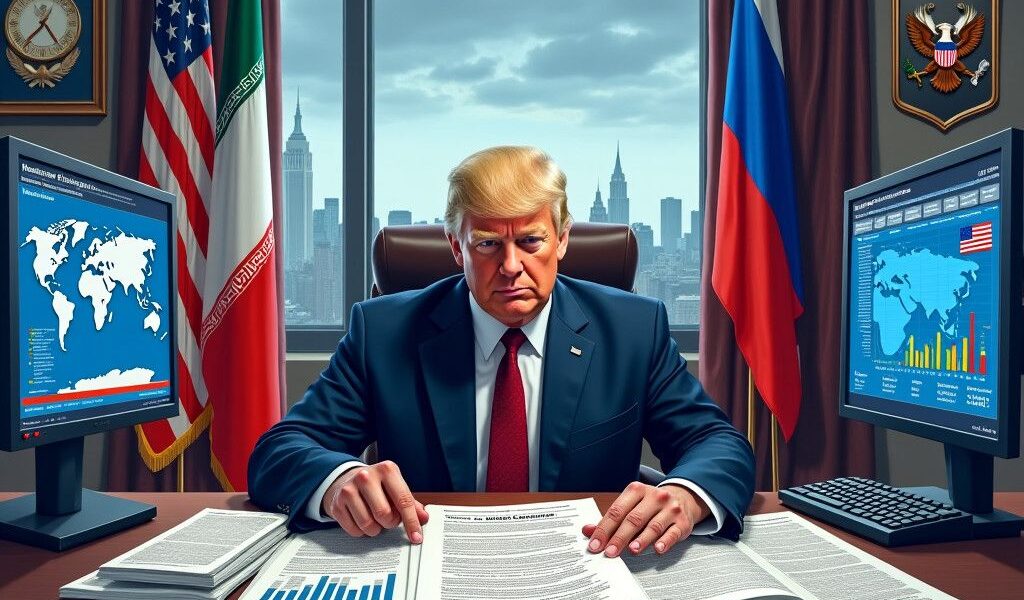The Impact of US Sanctions on Iranian and Russian Entities over Election Meddling
In a decisive move, the United States has imposed new sanctions targeting Iranian and Russian entities implicated in election interference. This action signals growing concerns over foreign involvement in democratic processes, particularly as the 2024 U.S. elections approach. The sanctions aim to deter these nations from further manipulation of electoral proceedings and underscore the U.S. government’s commitment to safeguarding its electoral integrity.
The rising trend of election meddling has grave implications for global democracy. According to a 2021 report by the U.S. Director of National Intelligence, both Iran and Russia have been identified as primary actors attempting to influence political outcomes in the U.S. through misinformation campaigns and cyberattacks. These sanctions are part of a broader strategy to counteract such threats and reinforce democratic norms.
The key targets of these sanctions arise from various analyses indicating their direct involvement in orchestrating campaigns aimed at shaping public opinion and discrediting electoral candidates. For instance, U.S. Treasury Secretary Janet Yellen emphasized that these actions were necessary to hold accountable those who engage in “malicious” attacks on U.S. election infrastructure.
One primary entity affected by these sanctions is the Islamic Revolutionary Guard Corps (IRGC) of Iran, which has been accused of facilitating cyber operations against U.S. electoral systems. In addition, the sanctions also implicate several Russian organizations known for their use of advanced technology and social media platforms to spread disinformation. This highlights the significant role that technology plays in today’s political landscape, prompting policymakers to reconsider regulations surrounding online platforms and their responsibilities in mitigating harmful content.
The implications of these sanctions extend beyond mere economic penalties. By targeting essential sectors such as finance and technology, the U.S. aims to isolate those responsible for these offenses and impede their operational capabilities. These actions serve as a warning to other nations contemplating similar interference tactics, reinforcing the notion that such behaviors will incur serious consequences.
Moreover, the sanctions also seek to address the technological aspect of election interference. In recent years, artificial intelligence (AI) has emerged as a double-edged sword in political contexts. While it offers innovative solutions for campaign strategies and voter outreach, it also enables actors to craft more sophisticated disinformation campaigns. The U.S. sanctions are a reflection of the growing awareness regarding the misuse of these technologies, urging both private and public sectors to adopt more stringent measures to safeguard electoral processes.
A notable example of AI misuse is the creation of synthetic media, often referred to as deepfakes. These altered or fabricated media pieces can significantly influence public perception and voting behavior. The responsibilities of platforms like Facebook and Twitter have come under scrutiny, compelling them to enhance their monitoring and content moderation frameworks. In response to the sanctions, tech companies are expected to step up their efforts in combating misinformation, not just from foreign actors but also from domestic sources.
In tandem with these sanctions, the U.S. is increasing its collaborative efforts with international allies to create a more unified front against election meddling. This partnership approach is designed to streamline intelligence sharing and develop coordinated strategies to detect and respond to threats quickly. For example, during the November 2020 elections, numerous countries conducted joint operations to survey and counter foreign influence, illustrating the effectiveness of collective action in establishing electoral security.
In conclusion, the recent sanctions against Iranian and Russian entities represent a robust response to foreign election interference efforts. The move reflects not only the U.S. government’s commitment to protecting its democratic processes but also raises broader questions about the role of technology in elections. As threats continue to evolve, ongoing vigilance and international cooperation will be essential in ensuring the integrity of elections for years to come.








